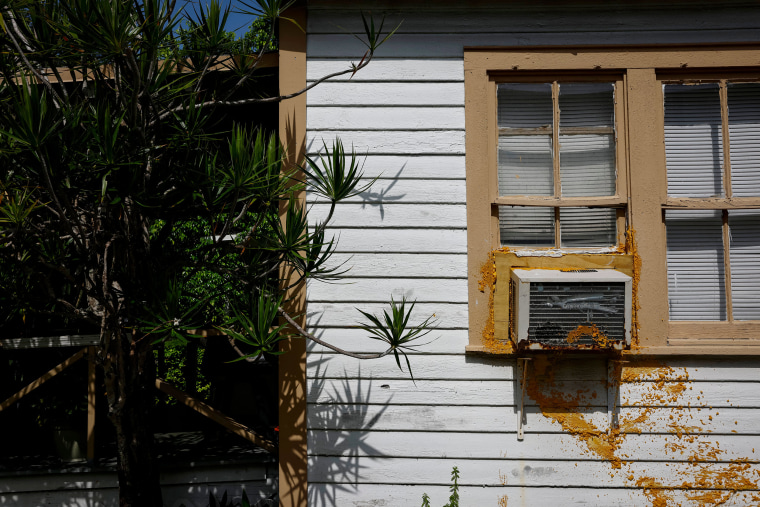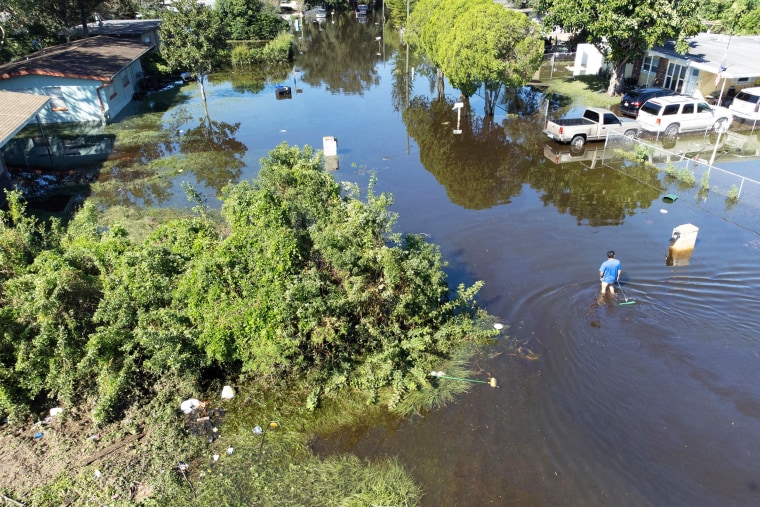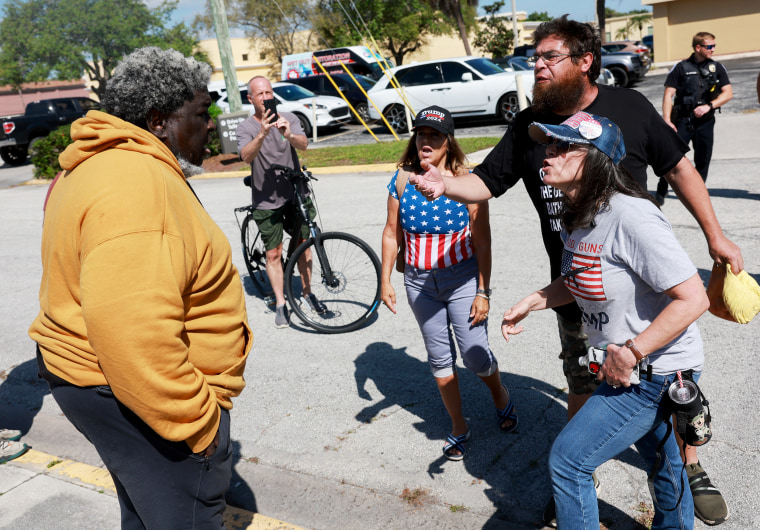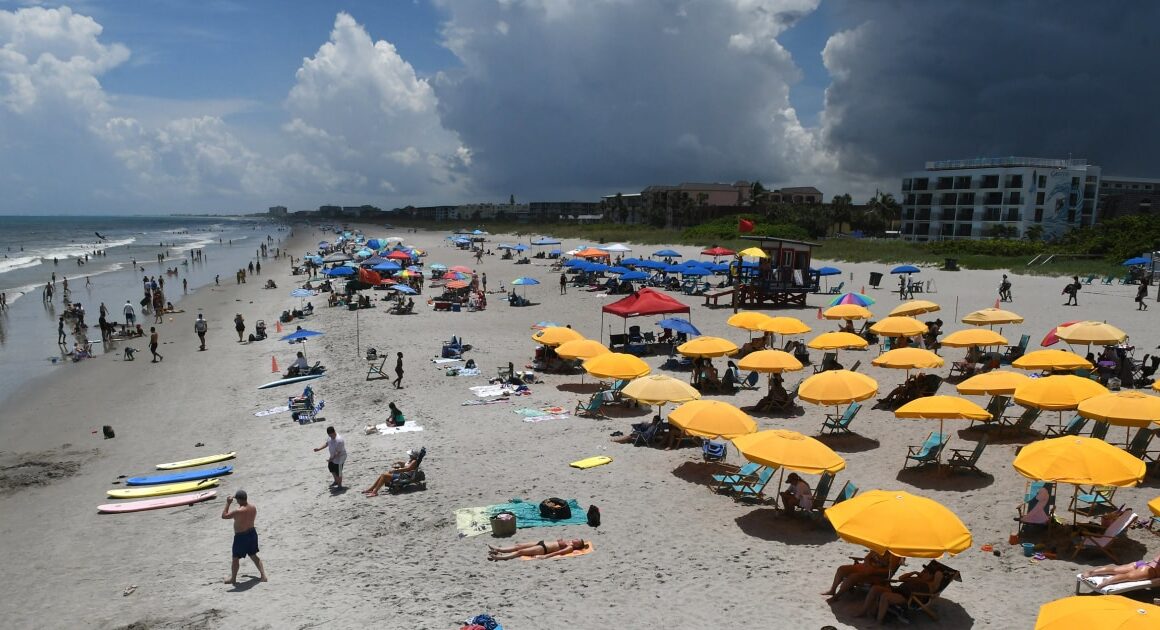One of the first signs Barb Carter’s move to Florida wasn’t the postcard life she’d envisioned was the armadillo infestation in her home that caused $9,000 in damages. Then came a hurricane, ever present feuding over politics, and an inability to find a doctor to remove a tumor from her liver.
After a year in the Sunshine State, Carter packed her car with whatever belongings she could fit and headed back to her home state of Kansas — selling her Florida home at a $40,000 loss and leaving behind the children and grandchildren she’d moved to be closer to.
“So many people ask, ‘Why would you move back to Kansas?’ I tell them all the same thing — you’ve got to take your vacation goggles off,” Carter said. “For me, it was very falsely promoted. Once living there, I thought, you know, this isn’t all you guys have cracked this up to be, at all.”
Florida has had a population boom over the past several years, with more than 700,000 people moving there in 2022, and it was the second-fastest- growing state as of July 2023, according to Census Bureau data. While there are some indications that migration to the state has slowed from its pandemic highs, only Texas saw more one-way U-Haul moves into the state than Florida last year. Mortgage application data indicated there were nearly two homebuyers moving to Florida in 2023 for every one leaving, according to data analytics firm CoreLogic.
But while hundreds of thousands of new residents have flocked to the state on the promise of beautiful weather, no income tax and lower costs, nearly 500,000 left in 2022, according to the most recent census data. Contributing to their move was a perfect storm of soaring insurance costs, a hostile political environment, worsening traffic and extreme weather, according to interviews with more than a dozen recent transplants and longtime residents who left the state in the past two years.
,
,

,
,
“It wasn’t the utopia on any level that I thought it would be,” said Jodi Cummings, who moved to Florida from Connecticut in 2021. “I thought Florida would be an easier lifestyle, I thought the pace would be a little bit quieter, I thought it would be warmer. I didn’t expect it to be literally 100 degrees at night. It was incredibly difficult to make friends, and it was expensive, very expensive.”
Cummings expected she’d have extra money in her paycheck working as a private chef in the Palm Beach area since the state doesn’t have an income tax. But the high costs of car insurance, rent and food cut into that additional take-home pay. After six months of dealing with South Florida’s heat and traffic, she began planning a move back to the Northeast.
“I had been so disenchanted with Florida so quickly,” Cummings said. “There was this feeling of confusion and guilt about wanting to leave, of moving there then realizing this is not anything like I thought it would be.”
,
,

,
,
While costs have been rising across the country, some areas of Florida have been hit particularly hard. In the South Florida region, which includes Miami, Fort Lauderdale and Palm Beach, consumer prices in February were up nearly 5% over the prior year, compared to 3.2% nationally, according to the most recent data from the Bureau of Labor Statistics.
Homeowners insurance rates in Florida rose 42% last year to an average of $6,000 annually, driven by hurricanes and climate change, and car insurance in Florida is more than 50% higher than the national average, according to the Insurance Information Institute. While once seen as an affordable housing market, Florida is now among the more expensive states to buy a home in, with prices up 60% since 2020 to an average of $388,500, according to Zillow.
For Carter, who made the move in 2022 from Kansas to a suburb of Orlando for the weather, beaches and to be closer to her grandchildren, the costs began to quickly pile up. She purchased a manufactured home and initially expected the lot rent in her community to be $580 a month. But when she arrived she learned her monthly bill was actually $750, and by the time she left it had jumped to $875 a month. Along with the $9,000 in repairs from the armadillos, her car insurance doubled and Hurricane Ian destroyed her home’s roof on her 62nd birthday.
,
,

,
,
There were also the ever-present conversations and disagreements over politics that started to wear on her. Carter, who describes herself as a “middle of the road” Republican, said she learned to keep her opinions to herself.
“You cannot engage in a conversation there without politics coming up, it is just crazy. We’re retired, we’re supposed to be in our fun time of life,” she said. “I learned quickly, just keep your mouth shut, because I saw people in my own community break up their friendships over it. I don’t like losing friends, and especially over politics.”
,
,

,
,
But she said the final straw was when she couldn’t find a surgeon to remove a 6-inch tumor from her liver that doctors warned could burst at any moment and lead to life-threatening sepsis. After being passed among doctors, she finally found one willing to remove the tumor. But when she called to schedule the surgery, her calls went unanswered and her messages weren’t returned. After months of trying and fearing for her life, she returned to Kansas to have the procedure done.
“It just seemed like one challenge after another, but I kept with it until there was literally a lifesaving event that I needed to get handled and I wasn’t able to do it there,” she said. “I think it was the most difficult year of my life.”
No state has had more residents relocate to Florida in recent years than New York, with 90,000 New Yorkers moving there in 2022, according to census data. Among all out-of-state mortgage applicants, nearly 9% were from New York in 2023, slightly lower than the previous two years but similar to 2019, according to CoreLogic. One of those New York transplants was Louis Rotkowitz. He lasted less than two years in Florida.
“Like every good New Yorker, this is where you want to go,” he said by phone while driving the last of his belongings out of the state to his new home in Charlotte, North Carolina. “It’s a complete fallacy.”
After years working in emergency medicine, and nearly dying from a Covid-19 infection he contracted at work, Rotkowitz said he and his wife were looking for a more pleasant, affordable lifestyle and warmer weather when they decided to buy a house in the West Palm Beach area in 2022. He got a job there as a primary care physician and his wife took a teaching position.
But he said he quickly found the Florida he’d moved to wasn’t the one he’d experienced on regular visits there over the years. His commute to work often took more than an hour each way, he struggled to get basic services like a dishwasher repair, and the cost of his homeowners association fees doubled.
“I had a good salary, but we were barely making ends meet. We had zero quality of life,” said Rotkowitz.
Along with the rising costs, Rotkowitz said he generally felt unsafe in the state between the erratic traffic — which resulted in a number of his patients being injured by vehicles — and a state law passed in 2023 that allowed people to carry a concealed weapon without a license.
,
,

,
,
“Everyone is walking around with guns there,” he said. “I consider myself a conservative guy, but if you want to carry a gun you should be licensed, there should be some sort of process.”
Veronica Blaski, who moved to Florida from Connecticut, said rising costs drove her out of the state after less than three years. When at the start of the pandemic her husband was offered a job in Florida making more money as a manager for a landscaping company, Blaski envisioned warm weather and a more comfortable lifestyle.
The couple, both in their 40s, sold their home in Connecticut and were starting to settle into their new community when Blaski said they were hit with a “bulldozer” of costs at the start of 2023.
Her homeowners insurance company threatened to drop her coverage if she didn’t replace her home’s 9-year-old roof, a $16,000 to $30,000 project, and even with a new roof, she was expecting her home insurance rates to double — one neighbor saw their insurance go from $600 a month to $1,200 a month.
She was also facing rising property taxes as the value of her home increased, her homeowners association fees went from $326 a month to $480, and her insurance agent warned that her car insurance would likely double when it was time to renew her policy. Her husband had to get a second job on weekends to cover the higher costs.
While Florida has an unemployment rate below the national average, Blaski and others said wages weren’t enough to keep up with their expenses. The median salary in Florida is among the lowest in the country, according to payroll processor ADP. To afford a home in one of Florida’s more affordable metro areas, like Jacksonville, a homebuyer would need to earn $109,000 a year, around twice as much income as a buyer would have needed just four years ago, according to an analysis by Zillow.
“My little part-time job making $600, $700 a month went to paying either car insurance or homeowners insurance, and forget about groceries,” said Blaski, who was working in retail. “There are all these hidden things that people don’t know about. Make sure you have extra money saved somewhere because you will need it.”
,
,

,
,
When her husband’s former boss in Connecticut reached out to see if he’d be willing to return, the couple leaped at the chance.
The reverse migration out of Florida isn’t just among newcomers, but also among longtime residents who said they can no longer afford to live there and are uncomfortable with the state’s increasingly conservative policies, which in recent years have included a crackdown on undocumented immigrants, a ban on transgender care for minors, state interventions in how race, slavery and sexuality are taught in schools, and a six-week ban on abortions.
After more than three decades in the Tampa Bay area, Donna Smith left the state for Pennsylvania in December, with politics and rising insurance costs playing a major role in her decision to leave.
“It breaks my heart, it really does, because Florida was really a pretty great place when I first moved there,” Smith said.
Having grown up in Oklahoma, Smith considered herself a Republican, but as Florida’s politics shifted to the right, she said she began to consider herself a Democrat. It wasn’t until the past several years, though, that politics started to encroach on her daily life — from feuds between neighbors and friends to neo-Nazis showing up at a Black Lives Matter rally in her small town.
“When I first moved to Florida, it was a live-and-let-live sort of beach feel. You met people from all over, everybody was relaxed. That’s just gone now, and it’s shocking. It’s just gone,” said Smith, 61, who works as a graphic designer and illustrator. “Instead, it’s just a constant stressful atmosphere. I feel as though it could ignite at any point, and I’m not a fearmonger. It’s just the atmosphere, the feeling there.”
She was already considering a move out of the state when she was told by her homeowners insurance company that she would need to replace her home’s roof because it was older than four years or her insurance premium would be going up to $12,000 a year from $3,600, which was already double what she had been paying. Even with a new roof, she was told her premium would be $6,900 a year. Before she could make a decision about what to do, her insurance policy was canceled.
Shortly after, Smith ended up moving to the Lancaster, Pennsylvania, area, where she is closer to her adult children. While the majority of voters in her new county chose Donald Trump in the last election, she said politics is no longer such a heavy presence in her everyday life.
“I don’t feel it is as oppressive. People don’t wear it on their sleeve like they did in Florida,” she said. “When you walk in a room, you don’t overhear a conversation all the time where people are saying ‘Trump is the best’ or ‘I went to that last rally,’ and they’re telling total strangers while you’re just waiting for your car or something. It was just everywhere.”
,
,

,
,
Costs and politics were also enough to cause Noelle Schmitz to leave the state after more than 30 years, despite her son having a year left in high school, and relocate to Winchester, Virginia. She said the politics became ever-present in her daily life — one former neighbor had a massive Trump banner in front of their house for years, and another had Trump written in big letters across their yard. When she put out a Hillary Clinton sign in 2016, it was stolen and her house was egged.
“I saw my neighbors and co-workers become more radicalized, more aggressive and more angry about politics. I’m thinking, where is this coming from? These are not the people I remember,” Schmitz said. “I was finally like, we need to get the hell out of here, things are not going well.”
For some Florida newcomers though, politics is the main draw to the state, said John Desautels, who has sold real estate in Florida for decades. While politics never used to be a topic for homebuyers, Desautels said it is now a regular subject his clients bring up. Rather than asking about schools or amenities in a community, prospective buyers are asking him about the political affiliations of a certain neighborhood.
“One of the first things they say is, ‘I don’t want to be in one of them X or Y political party neighborhoods,’” Desautels said. “I spend hours listening to people vent to me about fleeing the communist government of XYZ and they want to come to freedom or whatever. So the politics have been the biggest issue when we get the call.”
Even home showings have become a politically sensitive issue. He recalled showing an elderly woman one property where there were Confederate flags at the gate and swastikas on the fish tank.
But while politics are a lure to people arriving in the state, he said they’re also among the reasons sellers tell him they’re leaving, and the state’s politics have deterred some of his gay or nonwhite clients from moving there.
“The problem is, when we alienate protected classes, it sounds like a good sound bite, but you’ve got to remember those are people who spend money in our community,” he said. “For this pro-business, free state, I’m feeling it in the wallet, bad.”
In Kansas, Carter says it’s good to be home. She moved into a 55-plus community in a small town about 10 miles from Wichita. While in Florida she was paying nearly $900 in lot rent for her manufactured home, she now pays just $520 in rent for a cottage-style apartment — a place she estimates would have cost her $1,800 a month in Florida.
With the money she’s saving in Kansas, she can afford to visit Florida.
“People call me the modern-day Dorothy,” she said. “There’s no place like home.”
,
,

,








